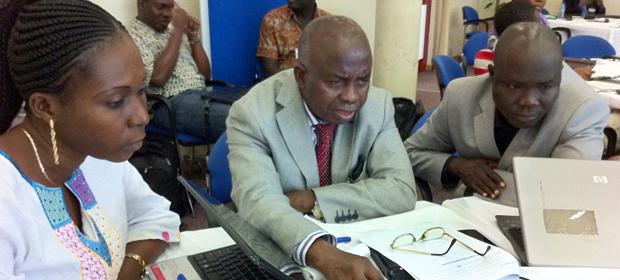Where We Work
See our interactive map


What does a country need in order to deal with its shortage of health workers? For one thing, information is key. To make the best use of current resources and plan for the future, national leaders need to know how many health workers the country has, what their qualifications and skills are, where they are posted, and how many new workers are likely to join them.
Five years ago a Joint Learning Initiative report spurred a growing awareness of the worldwide shortage of health workers. As director for human resources development for the West African Health Organization (WAHO), Professor Kayode Odusote wanted to help the 15 member countries gather and use health worker data to inform their decisions. But there was a long way to go.
“Most of what they had was tied to the payroll of the Ministry of Finance, and that did not provide the information required in terms of availability, distribution, and skills mix,” he recalls. “We needed to find something else that would d o it”—in short, he sought a human resources information system (HRIS) for the health workforce. And he wanted a system that would not be too complicated or expensive, and could be adapted to various contexts.
Fortunately, he says, “Somebody from Capacity Project gave me a DVD demo [of its iHRIS software], and I was able to test it.” iHRIS is a suite of tools for managing and supporting health workers. At a WAHO meeting “I showed the potential and asked countries, are you interested in trying it? Ghana opted to pilot test it, and that was the beginning of the story.”
Building on the work initiated by the Capacity Project, and in collaboration with the Ministry of Health and CapacityPlus, Professor Odusote led a pilot of iHRIS Manage in Ghana’s Northern Region. They explored the software’s ability to collate and analyze health workforce data that could enhance decision-making.
CapacityPlus is the USAID-funded global project led by IntraHealth International, which uniquely focuses on the health workforce needed to achieve the Millennium Development Goals. Placing health workers at the center of every effort, CapacityPlus helps countries achieve significant progress in addressing the health worker crisis while also having global impact through alliances with multilateral organizations. The project builds on the successful work of the Capacity Project, which worked in 47 countries.
“Ghana has agreed to adopt it and scale it up, and the Ministry is working on it right now,” Professor Odusote reports. The successful pilot inspired others to build on Ghana’s experience. Togo, Mali, Nigeria, and Sierra Leone are among the countries currently interested in using iHRIS in West Africa.
“Once we can get the French version, other countries will join us,” he adds. “We hope it will become the standard HRIS software in the region, as we could then exchange information and experiences as well as aggregate regional data readily.”
The iHRIS software uses Open Source, which means that local developers can modify the code to suit their needs. Professor Odusote explains why this is important. “We’re able to take the code, customize, modify it, and use it. Different countries have their own formats they use; with Open Source coding, it becomes easy to make changes. For instance, with the Nursing and Midwifery Council of Nigeria we found that the geographical division is different from that of other countries—so to modify this [in iHRIS Qualify] was easy.”
Professor Odusote stresses the value of building capacity in the region. “The contribution [of CapacityPlus] to my mind is really the partnership—which right now is not financial, it’s a technical partnership, and basically for me that is much more than money. If you can build a core nucleus of local capacity, that’s worth more than any money that you can get, because that’s sustainability.”
He continues, “Some of us believe that it is better to teach people to fish…so with technical support you learn to fish, and therefore you’re able to feed yourself much longer.” This approach is vital, he affirms. “A partnership that can build local capacity and sustainability is the key for everything that we do in this region.” Five years after he became interested in HRIS strengthening, Professor Odusote is finding many reasons to smile. “I think the future is very bright,” he says. “The absence of accurate and readily available health information is one of the greatest challenges in West Africa. Using Open Source technologies to foster innovation, adaptability, and ownership of health information systems can save countless lives.”
Special thanks to Kayode Odusote, and to Dykki Settle for interviewing Professor Odusote in Ghana.
A version of this piece was originally published as Voices#1, on the CapacityPlus website.



